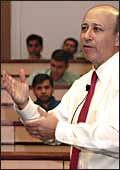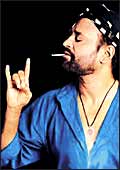|
What: 3 is Hutchison Telecom's global brand for their
third-generation (ergo, 3) mobile-phone networks that is present
in markets across Western Europe, Australia and Hong Kong
What about it: This correspondent spotted a Yellow WagonR
festooned with the '3' logo doing rounds of Mumbai's Prabhadevi
area late one night. The logo was inside a triangle looking like
the Superman logo. (Note to editor: No, I wasn't drunk.)
Is 3 Coming? The Telecom Authorities haven't set out
the guidelines for 3G networks in India as yet, but with marketers
such as Nokia making WCDMA (3G) available 3G-ready handsets like
the N70, you know it's coming. A decision on spectrum allocation
for 3G is expected by the first half of 2006 (Even though the
2100MHz bandwidth is the bone of contention for CDMA and GSM operators).
-Compiled by Kushan Mitra
Cigarettes Get The Stick
What: Ban on on-screen smoking, with effect from January
1, 2006
Why: Duh, because cigarettes kill-actually, some 800,000
of them every year in India. The more immediate reason, however,
was a study by WHO on impact of on-screen smoking on audiences
(Bollywood: Victim or Ally was the study's title)
Small Mercies: Historical and foreign movies, live news
and events, and interviews are excluded from the ban. But movies
produced before the ban will have to run warning captions
What Now: Last year, the government banned smoking in
public places, tobacco advertising and sponsorship of events by
tobacco companies. That means your loo at home is the only place
where you can smoke-that is, if your spouse doesn't mind
-Compiled by Ritwik Mukherjee
The Guy From 'Bric'Company
 |
| Goldman's
Blankfein: Point to make |
It was his firm that famously put
the world spotlight on the BRIC countries (Brazil, Russia, India
and China) two years ago, but Lloyd C. Blankfein, President &
COO of Wall Street giant Goldman Sachs, himself found time to
visit India only last fortnight. In Hyderabad to announce a grant
of $1 million (Rs 4.5 crore) from the Goldman Sachs Foundation
for the Centre for Analytical Studies at the Indian School of
Business, Blankfein was too rushed for media interviews, except
for a hurried press meet. Did all the traffic snarl-ups at Mumbai,
Bangalore and Hyderabad dampen his enthusiasm for India? Hardly.
"India has crossed the tipping point (in terms of its attractiveness
as an investment destination) and is a fabulous place to invest,"
he told reporters. He isn't being polite. Goldman already runs
a high-end back office in Bangalore and isn't ruling out the setting
up of more outside the Garden City. "We are looking at opportunities
and I will be surprised if we do not make an investment in India
within a year from now," he said. Better still, he didn't
think the Sensex's current levels were anything to worry about.
-E. Kumar Sharma
P-WATCH
A bird's eye view of what's hot and what's
not on the government's policy radar.
SCORECARD
This is what the economy looks like now: |
|
POSITIVES
» GDP growth to be 7 per cent plus in 2005-06
» Improvement
in states' financial positions
» Average
inflation rate at less than 5.5 per cent
» Fiscal
and revenue deficit targets to be met
NEGATIVES
» Coal,
power sectors continue to be laggards
» Sustaining
8-10 per cent GDP growth difficult
» Agricultural
growth rate may not hit 4 per cent
|
THE FIRST HALF LOOKS ENCOURAGING
Finance minister P. Chidambaram's mid-year scorecard for 2005-06
is more good than bad. The good news first: India remains on the
high growth trajectory, buoyed by the first-half GDP growth of
8.1 per cent. The expenditure and receipts trends shows that fiscal
and revenue deficits as well as inflation will remain under control.
But, as the Finance Minister himself said, "sustaining a growth
rate of 8-10 per cent and an investment rate of 26.3 per cent
of GDP (2003-04) will be difficult in the medium term". Also,
the farm sector is unlikely to grow at more than 3 per cent. That
means the overall growth rate will remain at 7 per cent levels.
-Ashish Gupta
FOR A FEW BILLION DOLLARS MORE
The Reserve Bank of India (RBI) has raised the interest cap
on non-resident External Rupee deposits by 25 basis points to
75 bps above libor, which is currently pegged at 4.83 per cent.
This means domestic banks can offer NRIs 5.50 per cent on one-two
year deposits, and 5.60 per cent on two-three year deposits. "NRIs
are our main source of foreign currency," says K. Cherian Varghese,
Chairman, Union Bank of India, adding: Till November 17, 2005,
outstanding deposits in NRE account are $21.3 billion (Rs 95,850
crore) in Indian banks, compared to $20.56 billion (Rs 92,520
crore) during the whole of calendar year 2005. With the us Federal
Reserve likely to hike its rate to 4.50 per cent, the NRI community
can expect some more largesse from RBI.
-Anand Adhikari
STAMP OF DISCORD
The Maharashtra government has zeroed in on a golden goose-stamp
duties. It wants HDFC Bank and ICICI Bank to pay stamp duties
on the entire mortgage value of home loans advanced by them. "The
agreements between borrowers and ICICI Bank are merely loan agreements
and not documents relating to deposit of title deeds," says a
bank official. Such agreements do not attract stamp duties. The
Maharashtra government is considering a law to plug this loophole.
It also wants bond houses, banks and other market participants
to pay arrears in stamp duties on all direct securities deals
done over the past 10 years. The bill: Rs 1,000 crore. Dealers
are naturally crying foul. If other states also follow suit, housing
loans and all bond market transactions will become more expensive.
Observers expect the matter to reach the courts.
-Mahesh Nayak
 |
| Chidambaram:
It's voluntary |
VOLUNTARY DISCLOSURE
The finance ministry wants individuals to voluntarily disclose
high-value purchases when they file their income tax returns.
The idea is to cull out individuals who use their unaccounted
money for such purchases. Says Amarjeet Singh, Partner (Direct
Tax), BSR & Co (KPMG's Indian avatar): "People are being made
accountable for their spending. And such voluntary disclosures
can help assessees avoid the taxman's notice."
CALLING RURAL INDIA
The telecom regulatory Authority of India (TRAI) is fast tracking
telecom penetration in rural India. A report, authored by Arvind
Virmani, Part-Time Member, TRAI, recommends the scrapping of rural
spectrum charges. It also wants a National Universal Rural Telecom
Licence with a nominal entry fee of Rs 30 lakh. This is expected
to lead to the emergence of specialised rural telecom suppliers,
which will be subsidised for operating in "inaccessible areas".
A decision will be taken on this issue soon.
-Kumarkaushalam
|







